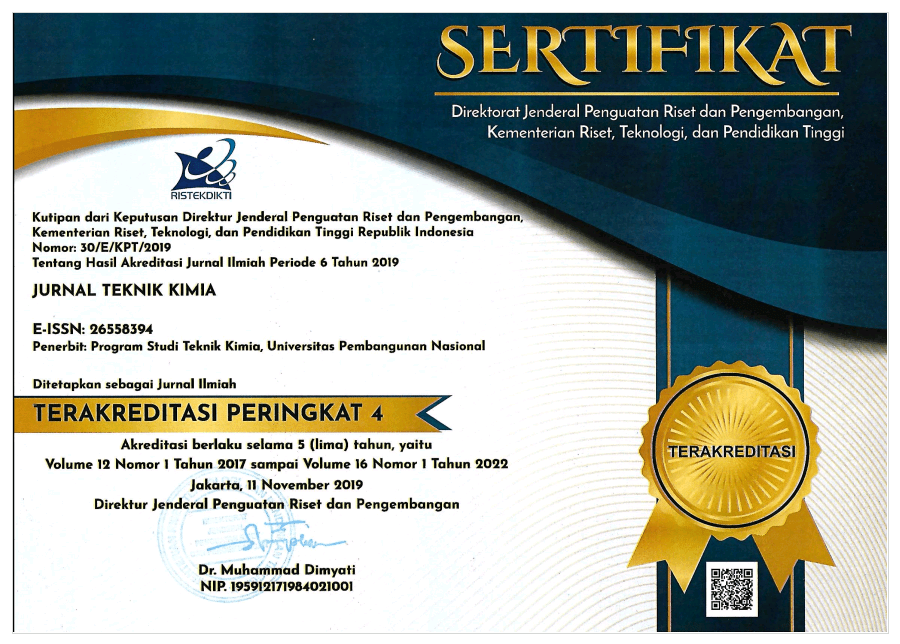Jurnal Teknik Kimia is a peer-reviewed national journal managed by Chemical Engineering Department, Universitas Pembangunan Nasional “Veteran” Jawa Timur. This scientific ethics code clarifies the ethical behaviour of all parties involved in the process of publishing article in this journal. The parties involved in the act of publishing scientific article include the publisher, the editorial board, the peer-reviewer, and the author.
Ethics code statement of scientific publication is based on Head of LIPI Regulation No. 5, 2014 about Ethic Code of Scientific Publication. The Ethic Code of Scientific Publication upholds three ethical values of publication, including:
1. Neutrality, free from conflict of interest within publication management.
2. Justice, gives the rightful authority to the author.
3. Honesty, free from duplication, fabrication, falsification, and plagiarism (DF2P) in the publication.
By adhering to these three ethical values, The Ethic Code of Scientific Publication gives a guidance to the publisher, the editorial board, the peer-reviewer, the author, and also the other parties in scientific journal publication system that complies ethical code and good scientific publishing management.
Journal Management’s duties and responsibilities
1. Defining the name, scope of science, scale, and (if necessary) accreditation of the journal.
2. Determining the editorial board membership.
3. Specifying the relations of publisher, editor, peer-reviewers, and the other parties in an agreement.
4. Respecting all of the confidential things for contributing researchers, authors, editors, and peer-reviewers.
5. Implementing norms and intellectual property right certainties, especially copyright.
6. Conducting journal policy review and submitting it to the author, editorial board, peer-reviewer, and reader.
7. Making ethical code regulation for editor and peer-reviewer.
8. Publishing journal regularly.
9. Ensuring financial support availability for sustainable journal publishing.
10. Developing cooperation and market network.
11. Preparing licence and other legal aspects.
Editorial Board’s duties and responsibilities
1. Bridging the reader and writer needs.
2. Encouraging sustainable improvement of publication qualities.
3. Implementing quality assurance process to publishing articles.
4. Promoting speech freedom objectively.
5. Maintaining integrity of the author’s academic track record.
6. Delivering correction, clarification, withdrawal, and (if necessary) apologies.
7. Responsible toward style and format of the paper, while the contents and statements in the paper is the responsibility of the author.
8. Asking the opinions from the author, reader, peer-reviewer, and other parties for improving the quality of journal.
9. Encouraging the assessment of journal if there is any finding from government.
10. Supporting initiative to decrease the research and publication error by asking the author to attach Ethic Clearance Form approved by Ethic Clearance Commission.
11. Examining the publishing policy effect toward author and peer-reviewer attitude to increase the responsibility and to reduce the error.
12. Having open minded for new opinions or other outlooks that may differ with personal opinions.
13. Not preserving personal, the author, or third party opinions that caused non-objective decisions.
14. Encouraging the author to make an improvement of their article until worth it to publish.
Peer-reviewer’s duties and responsibilities
1. Acquiring assignment from editor to examine the article and giving the examining result to editor as a substance of the paper eligibility to be published.
2. The article should be examined on time corresponding to scientific rules including collecting data method, the author legality, conclusion, etc.).
3. Reviewing the improved paper again according to the determined standard.
4. Encouraging the authors to improve their article, giving them critics, suggestion, and recommendation.
5. Protecting the author privacy by not disseminating correction, suggestion, and recommendation result.
6. Reviewer should not examine any paper involving him, whether directly or indirectly.
Author’s duties and responsibilities
1. Ensuring the list of authors meet the criteria as an author.
2. Having collective responsibility to their work and the contents of the article including method, analysis, calculation, and the details.
3. Declaring the resources (including funding), either directly or indirectly.
4. Explaining the limitation of their research.
5. Responding the peer-reviewer’s comments quickly in a professional manner.
6. Informing editor if the paper will be retracted.
7. Respecting the publisher if there is any request to not publish the invention like interview result or not publish the article in other publication media before published by the publisher.
8. Make a statement that the submitting article is original, had never been published anywhere, and not being in the reviewing process on other publisher.

This work is licensed under a Creative Commons Attribution 4.0 International License.
Pusat Publikasi | Teknik Kimia | Fakultas Teknik (Gedung Giri Reka ) | Universitas Pembangunan Nasional "Veteran" Jawa Timur, Indonesia
Jln. Raya Rungkut Madya, Gunung Anyar Surabaya, 60294 Email : jurnaltekkim@upnjatim.ac.id








